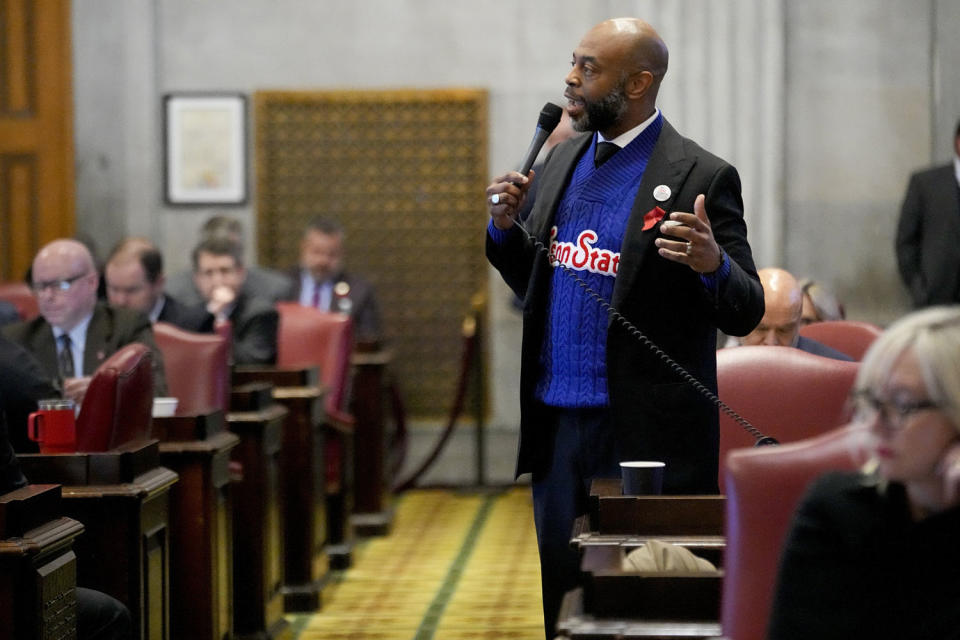Tennessee lawmakers dismantle HBCU’s board of trustees, to the dismay of students and alumni
- Oops!Something went wrong.Please try again later.
Black lawmakers, students and alumni of Tennessee State University are outraged that Gov. Bill Lee, in an unprecedented move, signed into law legislation that dismantled the storied historically Black college’s board of trustees.
Calls for a new board began in 2023, after multiple audit reports highlighted concerns around the mishandling of finances, housing and scholarships. A bill was then crafted that would replace three board members, before being amended to remove all of them.
A new forensic audit spanning from July 2019 through June 2023 was released Wednesday. It offered dozens of recommendations and pointed to “deficient processes” but did not uncover “fraud or malfeasance.” The following day, the Republican-controlled and majority-white Tennessee House voted in favor of the bill dismantling the board, 66-25. Lee quickly signed it into law.
Lee said he was “pleased” with the appointments for a new board — all of whom are Black and distinguished members of the Nashville business and political community.
TSU president Glenda Glover is stepping down in June, and a search is underway for her replacement.
Not everyone is happy with the goings-on.
Democratic Rep. Harold Love, who is a TSU alum, said vacating the whole board leaves the school in flux at a time when the president is a lame duck.
“We are deeply concerned about the effect it will have upon the administration, the students and the direction the school is trying to go into to rectify some of the concerns raised in the audits,” Love said.

He added, “We had an amendment in Government Operations (Committee) that vacated three board members, and that was the amendment we thought was going to be on the bill. In the conversations, things did not go the way I guess some of the members wanted to have happen, so as a result they chose that route.”
Many students at Tennessee State are in an uproar, and they believe the changes are too dramatic, making the school vulnerable to more issues, Nashville’s WTVF reported. Additionally, students told the outlet that their opinions were not considered before the law was passed.

Many students protested at the state Capitol in Nashville on Thursday, holding a banner that read: “TSU Take Over.”
After the vote, House Majority Leader William Lamberth tried to downplay the new law.
“All we’re talking about is the board,” he said. “It’s vacating some personalities and bringing others in. The goal is to make TSU successful.”
While vacating the board, the Tennessee Assembly members did not seem to take into account that TSU has been underfunded for years, to the tune of $2.1 billion, according to The Washington Post, which analyzed data from the National Center for Education Statistics between 1987 and 2020.
The audit showed that Tennessee State was owed $544 million in land-grant funding over five decades; $250 million were allocated in April 2022.
Lee and Glover did not immediately respond to NBC News’ request for comment.
“This is unprecedented, unfortunate, and uncharted waters for any public university in the state,” a statement from Tennessee State University read, according to The Tennessean. “We believe this legislation will disrupt our students’ educational pursuits, harm the image of the University, and remove a Board that had achieved success in its enhanced governance of TSU.” The statement also defended the university’s use of taxpayer dollars.
Last September, Secretary of Education Miguel Cardona and Secretary of Agriculture Thomas Vilsack sent a letter to Lee, highlighting data from the National Center for Education Statistics that showed white land-grant universities were funded significantly more than historically Black land-grant institutions.
The result was a “severe financial gap” in funding between the University of Tennessee-Knoxville, a land-grant institution established in 1862, and Tennessee State, which “in the last 30 years alone” should have had access to an additional $2.1 billion.
The Post also reported that Black land-grant universities nationwide suffered a $12.6 billion disparity of funds, with the worst cases at TSU and North Carolina A&T in Greensboro.
“It’s all disheartening,” said Ramona Willis, a retired school teacher who graduated from Tennessee State in the 1970s. “They hold back billions of dollars from the school, but yet they want to remove the board? Could some issues be because we just didn’t have enough money, money that is just sitting out there that should be ours? It’s hard to accept that they can know this and yet ignore it and put our school in disarray.”
This article was originally published on NBCNews.com

